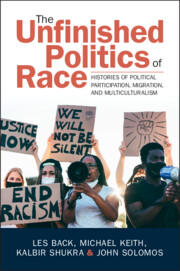 The Unfinished Politics of Race
The Unfinished Politics of Race Book contents
- The Unfinished Politics of Race
- The Unfinished Politics of Race
- Copyright page
- Contents
- List of Images
- Preface
- Introduction
- Part I Beginnings: Routes to the Present
- 1 From Empire to Multicultural Democracy?
- 2 Changing Contours of Race and the Political
- 3 Shifting Dynamics of Race and Local Politics
- Part II Moments in Time and Place: Rethinking Everyday Politics
- Part III History in the Present: Rethinking Social Science, Migration, and Race
- References
- Index
1 - From Empire to Multicultural Democracy?
from Part I - Beginnings: Routes to the Present
Published online by Cambridge University Press: 18 November 2022
- The Unfinished Politics of Race
- The Unfinished Politics of Race
- Copyright page
- Contents
- List of Images
- Preface
- Introduction
- Part I Beginnings: Routes to the Present
- 1 From Empire to Multicultural Democracy?
- 2 Changing Contours of Race and the Political
- 3 Shifting Dynamics of Race and Local Politics
- Part II Moments in Time and Place: Rethinking Everyday Politics
- Part III History in the Present: Rethinking Social Science, Migration, and Race
- References
- Index
Summary
This chapter outlines the historical background to the present by analysing the transition from empire to multicultural democracy that took place in the second half of the twentieth century. It situates the post-1945 history of race and immigration within a broader frame that includes both the role of race in the wider context and deeper history of the British Empire as well as the national and local experiences of race within the ‘mother country’ over a much longer history. We argue in this chapter that it is simplistic to see the postcolonial period as one that saw the move from empire to multicultural democracy. Rather, we suggest that it is important to provide a conceptual and empirical frame that highlights the ways in which processes of racialisation and exclusion helped to fashion a particular politics around race in British society whose consequences remain with us today. And so, we also outline the conceptual frame that we use in the book to explore the changing spheres of political incorporation that have shaped the position of minorities in British society.
Keywords
- Type
- Chapter
- Information
- The Unfinished Politics of RaceHistories of Political Participation, Migration, and Multiculturalism, pp. 17 - 29Publisher: Cambridge University PressPrint publication year: 2022


